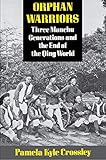Orphan Warriors : Three Manchu Generations and the End of the Qing World / Pamela Kyle Crossley.
Material type: TextPublisher: Princeton, NJ : Princeton University Press, [2022]Copyright date: ©1990Description: 1 online resource (324 p.)Content type:
TextPublisher: Princeton, NJ : Princeton University Press, [2022]Copyright date: ©1990Description: 1 online resource (324 p.)Content type: - 9780691224985
- Manchus -- Social life and customs
- HISTORY / Asia / China
- Albazinians
- Anhui
- Annam
- Babojab
- Bogue
- Britain
- Buddhism
- Canton (Guangzhou)
- Changxi
- Chen Tianhua
- Dai Xi
- Dong Fuxiang
- Eight Trigrams Rebellion
- Enming
- Fujian
- Gelao hui
- Gong Zizhen
- Guan Tianpei
- Guanyin
- Guizhou
- Hangzhou
- Heilongjiang (province)
- Hualianbu
- Hulun federation
- Jiangxi
- Jingshan diary
- Johnston, Reginald
- Kang Youwei
- Korea and Koreans
- Kuoputongwu
- Li Hongzhang
- Liang Qichao
- Manchukuo
- Manwen xuexiao
- Ming dynasty
- Mongolian banners
- Nanjing
- New Army
- adoption
- banishment
- black markets
- children
- clans
- corruption
- divination
- education
- examinations
- foreign aid and advisors
- fuxiaoqi canling
- genealogy
- hanjian
- homelessness
- identity
- imperial archives
- indemnities
- irregulars
- magistracy
- mercenaries
- opium addiction
- DS731.M35
- online - DeGruyter
| Item type | Current library | Call number | URL | Status | Notes | Barcode | |
|---|---|---|---|---|---|---|---|
 eBook
eBook
|
Biblioteca "Angelicum" Pont. Univ. S.Tommaso d'Aquino Nuvola online | online - DeGruyter (Browse shelf(Opens below)) | Online access | Not for loan (Accesso limitato) | Accesso per gli utenti autorizzati / Access for authorized users | (dgr)9780691224985 |
Browsing Biblioteca "Angelicum" Pont. Univ. S.Tommaso d'Aquino shelves, Shelving location: Nuvola online Close shelf browser (Hides shelf browser)

|

|

|

|

|

|

|
||
| online - DeGruyter Political Organizations : Updated Edition / | online - DeGruyter Second Site / | online - DeGruyter Psyche and Symbol : A Selection from the Writings of C.G. Jung / | online - DeGruyter Orphan Warriors : Three Manchu Generations and the End of the Qing World / | online - DeGruyter The Myth of American Individualism : The Protestant Origins of American Political Thought / | online - DeGruyter The Marginalization of Poetry : Language Writing and Literary History / | online - DeGruyter Religious Orthodoxy and Popular Faith in European Society / |
Frontmatter -- Contents -- Acknowledgments -- Conventions -- Introduction -- Part One -- Part Two -- Conclusion -- Source Abbreviations -- Notes -- Select Bibliography -- Index
restricted access online access with authorization star
http://purl.org/coar/access_right/c_16ec
In the mid-1600s, Manchu bannermen spearheaded the military force that conquered China and founded the Qing Empire, which endured until 1912. By the end of the Taiping War in 1864, however, the descendants of these conquering people were coming to terms with a loss of legal definition, an ever-steeper decline in living standards, and a sense of abandonment by the Qing court. Focusing on three generations of a Manchu family (from 1750 to the 1930s), Orphan Warriors is the first attempt to understand the social and cultural life of the bannermen within the context of the decay of the Qing regime. The book reveals that the Manchus were not "sinicized," but that they were growing in consciousness of their separate ethnicity in response to changes in their own position and in Chinese attitudes toward them. Pamela Kyle Crossley's treatment of the Suwan Guwalgiya family of Hangzhou is hinged upon Jinliang (1878-1962), who was viewed at various times as a progressive reformer, a promising scholar, a bureaucratic hack, a traitor, and a relic. The author sees reflected in the ambiguities of his persona much of the plight of other Manchus as they were transformed from a conquering caste to an ethnic minority. Throughout Crossley explores the relationships between cultural decline and cultural survival, polity and identity, ethnicity and the disintegration of empires, all of which frame much of our understanding of the origins of the modern world.
Mode of access: Internet via World Wide Web.
In English.
Description based on online resource; title from PDF title page (publisher's Web site, viewed 29. Jun 2022)


